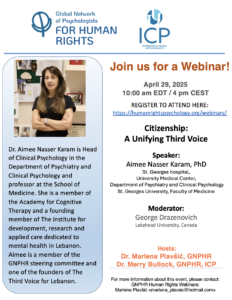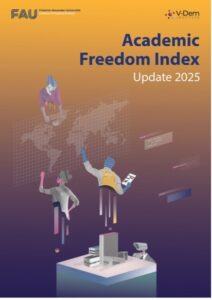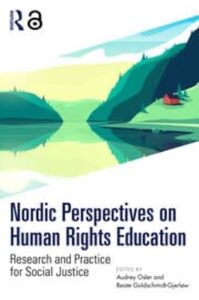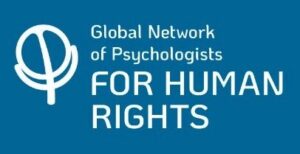Note from the Editors: The Bulletin of the Global Network of Psychologists for Human Rights (GNPHR) contains articles, events, news, and citations about domains where psychology and human rights intersect. Information is gathered from many sources and reflects many opinions. The goal is to stimulate reflection, discussion, and informed dialogue.The material published here does not imply that the GNPHR as a network, the GNPHR Steering Committee as a committee, or the individual subscribers share the expressed views.

April 2025
Table of Contents
SPECIAL FOCUS: International Day of Reflection on the 1994 Genocide against the Tutsi in Rwanda
- Network of HR Groups in Organizations
- Webinar April
- GNPHR Blog – promoting civil society discussion
SPECIAL COMMEMORATIVE DAYS – UN
Special Focus Day in April: International Day of Reflection on the 1994 Genocide against the Tutsi in Rwanda. The date 7 April, marks the start of the 1994 genocide which lasted for the 100-day period to mid-July 1994.
Rwanda has two public holidays mourning the genocide. The national mourning period begins with Kwibuka (Remembrance), the national commemoration, on 7 April and concludes with Liberation Day on 4 July.
UNESCO will mark the International Day in partnership with the Permanent Delegation of Rwanda to UNESCO by organizing a commemorative ceremony and photo exhibition to bring awareness to the 1994 Genocide and pay tribute to the victims.
Outreach Programme on the 1994 Genocide against the Tutsi in Rwanda and the United Nations
The USC Shoah Foundation – I Witness Ubumuntu Educators resources:
In this activity, students will recognize how current values in post-genocide Rwanda build social cohesion and prevent identity-based discrimination. To understand the importance of these values, students will explore the consequences of pre-genocide discrimination by listening to testimony from Tutsi survivors of the 1994 Genocide against the Tutsi in Rwanda. By learning from the past, students will reflect on their identity and the importance of their role in society toward building social cohesion. By the end of this activity, students will develop a social scenario that demonstrates how national values are necessary to prevent identity-based discrimination. This activity uses the testimonies of Tutsi survivors, Rose Burizihiza and Emmanuel Muhinda from USC Shoah Foundation’s Visual History Archive in IWitness.
GNPHR NEWS AND EVENTS
GNPHR Network of HR Groups in Psychology Associations
Link to the minutes: Here is the link to minutes and associations reports: https://humanrightspsychology.org/minutes-2024-11-07/
GNPHR Blog explores fostering civil society discussion
The Third Voice for Lebanon – Aimee Karam explains the development of an independent, non-partisan, non-sectarian and non-political pro-active Think Tank in Lebanon.
Webinar Series Human Rights Education
 April Webinar:
April Webinar:
Next Webinar April 29, 2025
Citizenship: A Unifying Third Voice
10am EDT / 4 pm CET
Register Here
For past Webinars, see: https://humanrightspsychology.org/webinars/
CONTENT AREAS AND NEWS
Academic Freedom / Higher Education
Scholars at Risk Annual Report 21024. https://www.scholarsatrisk.org/annual-report-2024/
Europe scrambles to help researchers escape Trump
Juliette Portala & David Matthew, Science|Business, 20 March 2025.
US researchers may soon have several options to flee the government crackdown on science. Meanwhile, Trump’s restrictions are hitting some in Europe.
EU science ministers are calling on the European Commission to stand ready to welcome US researchers threatened by Donald Trump’s ongoing tightening of restrictions on US science and provide them with concrete opportunities to pursue their work.
In a letter addressed to research commissioner Ekaterina Zaharieva on Wednesday and seen by Science|Business, 13 governments asked the EU to show solidarity and welcome “brilliant talents from abroad who might suffer from research interference and ill-motivated and brutal funding cuts.” “The current international context reminds us that freedom of science can be put at risk anywhere and at any time,” they wrote.
Immigrants and Freedom of Speech
German Lopez, NY Times, March 24, 2025.
The Trump administration has tried in recent weeks to deport several immigrants who spoke out against Israel. First, it arrested Mahmoud Khalil, a green-card holder who’d joined pro-Palestinian protests at Columbia University. Officials also arrested a Georgetown University researcher with an academic visa. They deported a nephrologist at Brown University, even though she had a valid visa. Another student activist at Columbia fled to Canada after immigration officials came to her home.
The Coalitions We Need to Defend Open Inquiry
Jackie Pedota & Liliana M. Garces, THE, March 13, 2025.
Since 2023, about 120 anti-DEI bills have been introduced across 29 states, and 15 of them have become law. These proposed bills and enacted legislation have largely been met with silence from university leaders. But over the past month, as attacks on diversity, equity and inclusion policies rose to the federal level via multiple executive orders and a Dear Colleague letter from the Department of Education, a broad coalition—professional associations in higher education, labor organizations, civil rights groups and elected officials—has filed numerous federal lawsuits challenging their constitutionality, including at least four suits involving educational organizations as plaintiffs. By taking legal action and securing a preliminary injunction against two of the executive orders, these coalitions are breaking the silence of recent years to send a clear message about the legality and harmful consequences of these policy changes for higher education and society.
Children/Youth
Children are not future producers and customers: a plea for the moral imperative of acting now.
Mark Tomlinson, James Radner, Volume 9, Issue 3, p152-153, March 2025, The Lancet, Child& Adolescence Health.
In 2017, The World Bank launched the flagship Human Capital Project, followed by the first Human Capital Index in 2018.1 The project was a global effort to accelerate investments in people to improve equity and economic growth. Although The World Bank did not invent the term human capital, they firmly inserted the term into the global health communication architecture. The Human Capital Project aims to design and implement multisectoral initiatives that build human capital across the life course.
Crimes against humanity
‘People cry, get angry’: remembering the enslaved in Ghana’s remarkable sculpture park.
Sarah Johnson, The Guardian, 3 March 2025. Kwame Akoto-Bamfo started by shaping one clay head in 2009. Now thousands are displayed at the Nykyinkyim Museum, each representing an African who was lost to slavery.

At the end of a sandy path, lined with bamboo trees, lies a clearing with thousands of clay head sculptures. One is of a woman whose hair is half done, another shows a man blindfolded. Some heads have masks signifying royalty. In a small pond are dozens more sculptures, some with shackles round their necks.
Each head placed at the Nykyinkyim Museum in Ghana represents someone who was enslaved and taken from the continent of Africa by Europeans to face a life of struggle, brutality and death. “It’s emotional for me, I have to control my feelings every time I come,” says Ackah Komla Swanzy , who is a a griot (a west African storyteller and educator) and an artist who makes some of the sculptures. “These are my own people. I view them as my siblings. It’s like losing your family member who you won’t see again.”
The sculptures are part of the Ancestor Project, conceived by Kwame Akoto-Bamfo, an artist, educator and activist, who founded the museum in 2019. Nkyinkyim is an Akan word that means “twisting”. It is also the name of a symbol that represents the nature of life’s journey and the characteristics required to thrive in it.
The museum is in Ada, about 100 miles (160km) east of the capital, Accra, and has become a place for people, mostly those of African descent, to confront the past through art and education. The 46-hectare (115-acre) site houses Akoto-Bamfo’s studio, features a visual archive of African history and culture, including models of Indigenous architecture, and pays homage to aspects of black history that are often overlooked – such as the contribution of soldiers from African countries in the first and second world wars. Visitors can choose to stay overnight at accommodation on site and take part in art workshops, pilgrimages, naming ceremonies and initiation rites.
Displaced/Migrants/Refugees/Stateless
The new economics of immigration. A fresh critique of migration is gaining ground. Liberals must take it seriously.
The Economist, March 13 2025.
IN ONE RICH country after another, immigrants are blamed for society’s problems. On March 10th J.D. Vance, America’s vice-president, said: “You go across the world, and you see a very consistent relationship between a massive increase in immigration and a massive increase in housing prices.” Stephen Miller, the White House deputy chief of staff, warns that “If you import the third world, you become the third world.”
Complaints about migrants are as old as Jacob’s trek into Egypt. But politicians like Mr Vance and Mr Miller are drawing on a new critique of the liberal case for immigration. They make three claims: that immigrants are taking houses from citizens; that, even if they work, they are bankrupting welfare systems and jumping the queue for public services; and that they are spoiling the culture that made the West prosperous.
It would be a mistake to dismiss these claims as xenophobic guff, like the stories that migrants in Ohio eat pets. What makes them powerful is that they are grounded in academic research. Only by grasping their strengths can liberals reject their excesses; and only by acknowledging where policy falls short can they improve it. To defeat the new nativists, liberals must understand what they get right and what must be fixed.
Education
Inclusion, Exclusion, Racism
International Day for the Elimination of Racial Discrimination 2025.
Polli Hagenaars
Secretary-General’s message: “The poison of racism continues to infect our world – a toxic legacy of historic enslavement, colonialism, and discrimination. It corrupts communities, blocks opportunities, and ruins lives, eroding the very foundations of dignity, equality, and justice. As the theme of this year’s International Day reminds us, 2025 marks the 60th anniversary of the International Convention on the Elimination of All Forms of Racial Discrimination – a powerful, global commitment to eradicate racial discrimination in all its forms.”
We need to recognize the deep psychological and social consequences of racial discrimination. Dismantling racism requires not only legal action but also education, advocacy, and mental health support. How can psychology contribute to a world free from racial discrimination?
More than just belonging? Uniqueness’ role in inclusion experiences.
Peter Luca Versteegen & Byron G. Adams. Group Processes & Intergroup Relations, 0(0), February 25, 2025.
Inclusion experiences are central to an individual’s well-being, but when do individuals feel included? Does it suffice to belong to the larger group (e.g., a work team or society), or do individuals also need to feel unique within that group, as optimal distinctiveness research would suggest? In this paper, we examine whether feeling unique improves an individual’s well-being beyond belonging only. Two correlational studies with Europe-based employees (N = 292, N = 295) show that uniqueness explains well-being when controlling for belonging. An online experiment from a general sample in the US (N = 666) provides indicative causal evidence that feeling unique improves well-being while holding belonging constant. Together, this research indicates that uniqueness plays a vital role in individuals’ inclusion experiences, such that it improves well-being beyond belonging. However, isolating the two components remains intricate, and we discuss avenues for future research to operationalize the two inclusion needs.
People experience exclusion as harmful even if excluded from a group they do not want to belong to (Gonsalkorale & Williams, 2006). It is thus vital to create inclusion experiences that promote well-being.
Antisemitism in the Oval Office. A confrontation seen with a historian’s eye.
Timothy Snyder, March 7, 2025.
The attempt to humiliate Volodymyr Zelens’kyi in the Oval Office a week ago was an American strategic collapse. It heralded a new constellation of disorderly powers, obsessed with resources, seizing what they can. Inside that new disaster is something old and familiar that we might prefer not to see: antisemitism. The encounter in the White House was antisemitic.
I am historian of the Holocaust. I was trained by a survivor. Jerzy Jedlicki was nine years old when the Germans invaded, and fourteen when he emerged from hiding in Warsaw, and a prominent Polish historian by the time we met. He talked to me about antisemitism for decades, from the time of the breakup of the Soviet Union until his death in 2018. The way that I reacted to the scene in the Oval Office, and how I have pondered and considered it since, have to do with my research, but also with him.
Four decades on, still no justice for South Africa’s Apartheid-era atrocities
Tom Canetti, FRANCE 24, March 9, 2025
Victims of Apartheid-era atrocities are suing the South African government for damages over failing to prosecute those suspected of committing Apartheid-era crimes. The Truth and Reconciliation Commission identified some 300 suspects to be investigated for possible prosecution, but the vast majority were never pursued.
Voices Against War
Middle East
Psychologists Call for Justice and Accountability: Confronting the Atrocities Against Palestinian Lives
This is an official statement of the Society for the Study of Peace, Conflict, and Violence, Division 48 of the American Psychological Association, and does not represent the position of the American Psychological Association or any of its other Divisions or subunits.* As 2025 begins, violent conflicts and gross violations of human rights are causing death and displacement on a massive scale, creating humanitarian crises around the world.1 As psychologists, we take seriously the February 2021 policy resolution on “APA, Psychology and Human Rights,” adopted by American Psychological Association’s Council of Representatives, which encourages members of our profession “to support and advocate for populations at risk of human rights violations, including marginalized populations both domestically and globally.”2 This resolution followed a report from the APA Task Force on Human Rights, which included the recommendation that “APA’s advocacy for human rights should extend to international human rights concerns, including in some situations making direct requests or criticisms of foreign governments.”
Women
Kyriarchy: Understanding The Pyramidal Structure Of The Oppressor And The Oppressed.
Nashra Rehman, Feminism in India, March 2025.
Kyriarchy appears to be difficult, but it is simple and clear. Fiorenza coined it to acknowledge the term as a broader social system that reflects hierarchy, oppression and injustice.
Kyriarchy is a term that denotes multiple social systems which remain interconnected or intersectional to one another. The word is no longer used in discussions on understanding submission, exploitation and oppression. Since it is not discussed, it does not mean it is not applicable. Elisabeth Schussler Fiorenza is a Roman Catholic Feminist Theologian who coined the term in her influential work, But She Said, in 1992. The term comprises two Greek words: Kyrios (Lord, Master) and Archein ( To rule, Dominate).
Fostering Human Rights for Girls and Women Globally
In August 2024, the American Psychological Association (APA) Council of Representatives approved a Resolution on Supporting Psychologists’ Education and Research about and Advocacy against Violations of Girls’ and Women’s Human Rights Globally. International Council of Psychologists (ICP) member Silvia Canetto, who was the primary force moving this resolution forward, authored this resolution, and ICP member Merry Bullock was the creative force behind the organization and making of the collective reading and video. To bring attention to this critical document resolution, APA’s Division 52, Society of Global Psychology’s International
Committee for Women (ICfW), has produced a collective reading of this resolution that was released on International Women’s Day, March 8th, 2025. You can read the resolution and watch the video here https://div52.net/activities/icfw/. [Resolution on Supporting Psychologists’ Education and Research about, and Advocacy against Violations of Girls’ and Women’s Human Rights Globally, The International Psychologist. vol. 65 no.01, Dr. Nancy M. Sidun & Dr. Judith Gibbons].
PUBLICATIONS
 Migration steuern – Eine Anleitung für das Hier and Jetzt [Managing migration – A guide for the here and now.] Daniel Thym, Edition Mercator, C.H. Beck. 20 März 2025.
Migration steuern – Eine Anleitung für das Hier and Jetzt [Managing migration – A guide for the here and now.] Daniel Thym, Edition Mercator, C.H. Beck. 20 März 2025.
Schöne neue Welt der Vielfalt hier, die Fremden als Gefahr dort – beide Bilder waren schon immer viel zu einfach, um dem komplexen Phänomen der Einwanderung gerecht zu werden. Der renommierte Migrationsexperte Daniel Thym zeigt in seinem hochaktuellen Buch, dass die Asylmigration und die Fachkräfteanwerbung sinnvoll gesteuert werden können – wenn wir ein Selbstbild als Einwanderungsrepublik entwickeln, das die vielfältige Gesellschaft zusammenhält.
[A brave new world of diversity here, foreigners as a threat there – both images have always been far too simplistic to do justice to the complex phenomenon of immigration. In his highly topical book, renowned migration expert Daniel Thym shows that asylum, migration, and the recruitment of skilled workers can be effectively managed – if we develop a self-image as an immigration republic that holds our diverse society together.]
 Academic Freedom Index
Academic Freedom Index
The Academic Freedom Index (AFI) assesses de facto levels of academic freedom across the world based on five indicators: freedom to research and teach; freedom of academic exchange and dissemination; institutional autonomy; campus integrity; and freedom of academic and cultural expression. The AFI currently covers 179 countries and territories, and provides the most comprehensive dataset on the subject of academic freedom.
 Building Bridges to Inclusive Leadership Through the Lens of Cultural Narratives,
Building Bridges to Inclusive Leadership Through the Lens of Cultural Narratives,
edited by Joseph E. Trimble, Josephine C. H. Tan, and Antonio Jimenez-Luque, Cognella.
The book examines how leadership styles are influenced by culture, social factors, and lived experiences on a global scale. It acknowledges the diversity in the exercise of leadership and its effectiveness in different contexts.
The book initially started as an international project of Jean Lau Chin who was a well-known and highly respected researcher in the field of leadership. When Chin tragically passed away in the early days of the COVID-19 pandemic, the project ceased. Tan approached Trimble, who was originally the co-editor with Chin, with a suggestion to continue the project in her honor. Together with Jimenez-Luque, the book is finally released in early January 2025.The book is a tribute to Chin who served as the ICP President in 2017-2018. The prologue is authored by Debra Kawahara who is the current President of the American Psychological Association, and the epilogue is authored by Lynn Pasquerella, who is a former President of the American Association of Colleges and Universities.
 Nordic Perspectives on Human Rights Education. Research and Practice for Social Justice.
Nordic Perspectives on Human Rights Education. Research and Practice for Social Justice.
Audrey Osler, Beate Goldschmidt-Gjerløw (Eds), Routledge, 2025.
Backed by a range of case studies and recent developments in human rights education research, Nordic Perspectives on Human Rights Education guides readers through an analysis of educational inequities and identifies how internationally agreed-upon human rights standards may inform social justice practices within schools.
In an age characterised by authoritarianism and extremism, but also social and climate justice movements, this book provides a critical analysis of current practice within schools. Contributing authors also discuss how a human rights framework may improve practice, supporting intersectional thinking and more sustainable learning environments, while also empowering teachers to confidently navigate issues of gender, national identity and minority rights.
OPPORTUNITIES
Call for Papers
Call for Papers: Understanding Stress and Stigma in Immigrant Communities. Special Issue of Translational Issues in Psychological Science. Deadline for Submissions: June 29, 2025.
Please feel free to forward this correspondence to interested colleagues and the psychologists in training with whom you work. Mare Meadows, Associate Publisher, Journals, American Psychological Association.
Guest Editor: Shu-Sha Angie Guan. https://www.apa.org/pubs/journals/tps
Awards
The International Council of Psychologists calls for nominations for the International Human Rights Award. Deadline: June 30, 2025
This award recognizes work being done by psychologists to advance human rights. The award is given to a psychologist or a group/organization largely composed of psychologists that has done substantial work to address human rights issues locally or globally through education, research, service or advocacy. Human rights are defined broadly and include social, cultural, economic, civil, and political rights.
UPCOMING EVENTS
Convening the global sustainability community. 6–19 June 2025, Istanbul Congress Centre, Türkiye.
The Global Sustainable Development Congress brings together the world’s leading thinkers, policymakers and actors from different sectors to drive new alliances and create positive action for a more sustainable future. Over four days, keynote speakers, panellists and representatives from our track and global content partners will share their insights on health, sustainable cities, clean energy, AI, gender equality, the environment and much more.
 Psychology Day 2025 – April 24, 2025
Psychology Day 2025 – April 24, 2025
Psychology Day at the United Nations will be on april 24, 2025. The theme for the 18th annual Psychology Day is “From Crisis to Growth: Psychological Contributions to Building Global Resilience“
CONTACTS: Published by the Global Network of Psychologists for Human Rights – www.humanrightspsychology.org
Disclaimer: The website of the Global Network of Psychologists for Human Rights (GNPHR) contains articles, events and news about the domain where psychology and human rights intersect. The information presented in this Bulletin, does not imply that the GNPHR shares the views and beliefs in the articles.
- @GNPHR1
- How to get involved – read how you can contribute to the global network
- Consider contributing a Blog/Commentary
- News and Bulletins from the GNPHR – Subscribe to GNPHR
- Email addresses:
Ways to Participate in Global Network Activities
- Share Your Experiences and Examples
One of the best ways to illustrate the intersection of psychology and human rights is through example. We are looking for examples of your encounters with human rights issues in your professional life. You might describe a time when you protected (or failed to protect) human rights, or advocated for what you saw as a human rights issue. The events might be in your clinical, research, academic, applied, or volunteer work. Please send your narrative / story (500-1000 words) to Marlena Plavšić (marlena_plavsic@hotmail.com). We will compile these for publication in the GNPHR Bulletin and on the website. Please also indicate if you would like your stories to remain anonymous. - Share your Expertise and Opinions
We invite you to contribute a blog or opinion piece on general human rights issues; human rights education or strategies for raising the profile of human rights within psychology or your professional life. Students are welcome to contribute, including on student needs for learning about and addressing human rights. Please contact the GNPHR Blog editor (blogeditor@humanrightspsychology.org) with ideas for the article you would like to write! - Send articles/news/events
If you come across a human rights article or news, or know of an upcoming hunman rights event, please send for publication in the Bulletin. Send to the Bulletin editor Polli Hagenaars (polli.hagenaars@gmail.com).

